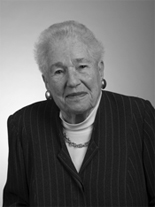SSA Centennial Celebration
Profiles of Distinction Series
Beatrice “Buddy” Mayer, E.X. 1947
Visiting Committee Member 1990 – present
Beatrice Mayer had to request more than once to be admitted to the School of Social Service Administration. Interested in turning her experience and abiding fierce interest in social welfare into a role as an advocate and patron for the cause, she was told that slots in the master’s program were held for those who “would use their education to make a living,” she says now with a chuckle.
It’s easy for Ms. Mayer to be amused by the initial thinking of administration back in 1946. After all, she was persistent and impressive enough to convince the dean that she would be an asset and attended SSA for a year until getting married and having the first of her two children. And she has shown, with more than 50 years of commitment to the School and a wide variety of causes, how important the role of board member and philanthropist is to the direction and success of institutions.
The youngest of three children of Nathan Cummings, the founder of Consolidated Foods (later changing its name to the Sara Lee Corporation), Beatrice “Buddy” Cummings majored in chemistry at the University of North Carolina during the first half of WWII, but her real interest lay in social issues. In Chicago after graduation, she went to the Red Cross to help the war effort.
“I told them, ‘I didn’t come here to roll bandages, I want to work with people in need,’” Ms. Mayer recalls. She got her wish, assigned to work with the families of service members who requested leave due to issues like illness, poverty, or stress. “I went all over the city and met every type of family. I found it fascinating,” she says. “I learned to visit the Eastern European families around noon, so they’d invite me for lunch with that delicious food.”
After two years with the Red Cross, her supervisor told her she should get a master’s degree, leading her to SSA. But before her second year, with plans to focus on psychiatric social work, she married Robert Mayer, and they started a new life together. “But my interest in the field never stopped,” she says.
Ms. Mayer was among the original members of SSA’s Visiting Committee, which she has served on for more than five decades, now as a Life Member, and she has been a confidant and advisor to a succession of deans. “I made it my business to get to know them. Harold Richman (Harold A. Richman, Ph.D.), for example, became a good friend, and we talked constantly about course content and student goals,” she says.
Jeanne Marsh (Jeanne C. Marsh, Ph.D.), SSA’s current dean and George Herbert Jones Distinguished Service Professor, says that Ms. Mayer has been a consistent counsel in nearly 15 years total serving as dean. “In meetings and one-on-one, she’s ready to ask probing questions, to add new ideas, and to help us think through our choices,” she says. “Her longstanding commitment to this institution is impressive.”
Ms. Mayer has also been an important source of fiscal support for the School, often providing resources for nascent programs or new opportunities, allowing SSA to expand and innovate. Her support through the Nathan Cummings Foundation, a philanthropy named after her father, has helped house the Graduate Program in Health Administration and Policy at SSA, launch the School’s program for older adults, and attract Mose and Sylvia Firestone Professor Neil Guterman and his work on violence prevention.
“Our support for larger organizations through the Foundation is usually to help plant seeds for future growth, to act as a catalyst to help further an important project,” Ms. Mayer says. The Cummings Foundation is only one of several philanthropies that she helps guide, and their support has helped institutions across the country. Many projects that Ms. Mayer supports are tied to her long-standing love for art— the extensive collection she and her late husband created includes pieces by giants such as Roy Lichtenstein and Diego Rivera, as well a wide array of notable Chinese pottery.
For Ms. Mayer, though, supporting the arts is often also another way to help those living in distressed communities. “Disadvantaged children have the right to exposure to culture and visual arts and a world beyond their immediate world. Art enhances their emotional life and their imagination,” she says. “I go to the MCA [Museum of Contemporary Art] all the time and just sit in the back in the education wing, which is in my husband’s name. I listen to the repartee between the teachers and the students, listen to them talking about art. I like to think our support has helped make the children’s visit more meaningful.”
